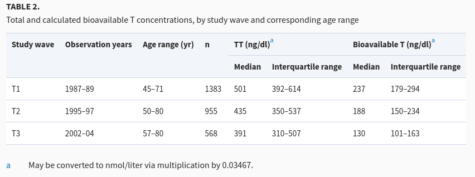Men’s testosterone levels are going down
Why does this matter?
When people hear that men’s testosterone levels are dropping they take that for granted. According to Ronald W. Dworkin, a medical doctor, author, and Ph.D. holder, Testosterone is an essential chemical for men. During men’s teen years it causes many changes. Such as men’s voice deepening, facial hair growth, and muscle strengthening. During adulthood, it is important to maintain men’s reproductive organs. And according to transform now, “the hormone has other vital functions such as helping with metabolism[1], cognitive processes[2], some sleep problems[3], preventing cardiovascular disease[4], low bone density[5] as well as several other important functions.”
So, it is very important for men to have testosterone, as it affects the way they grow. So when we find that it is decreasing, we should strive to find out as much as possible.
How much has it gone down?
So the importance of testosterone is clear now. But now we need to know how bad the issue is. One way to find that is to see how far it has gone down.

This figure, from the Journal of Clinical Endocrinology & Metabolism, shows that men’s median total testosterone dropped 110 points between 1987-2004. This is an almost 22% decrease in 17 years. And men’s median bioavailable testosterone, the testosterone in your bloodstream, dropped about the same at 107 points down.
When did this start?
It is important to find out when this started to see if anything correlates with the period. The earliest data found is from the Journal of Clinical Endocrinology & Metabolism. That data started with men aged 65-69 in 1984. And from that one, it found an 11% decrease from them to men aged 64-68 in 1990.
Which age demographic does it affect most?
which demographic is most affected is important to find so we can treat the people who need it most first.
Researchers from the Journal of Clinical Endocrinology & Metabolism have looked at the same age group in different time periods, and testosterone levels have gotten lower. you can infer this data to mean that their testosterone will be lower with each new generation. So the latest generation would be the most affected.
What is causing this?
To see if low testosterone is fixable, we first need to find the cause. According to Laine Bergeson, a nutrition writer for next avenue, “Middle-aged men and women who are exposed to high levels of certain chemicals found in plastics have reduced levels of testosterone, according to a new study published in the Journal of Clinical Endocrinology.” And according to transform now lack of sleep, lack of exercise, obesity, Certain foods, especially soya-based foods, smoking, marijuana, alcohol, and A lack of vitamins and minerals can lower testosterone as well.
How can we reverse this?
We want to reverse this phenomenon so that men are able to grow up with their necessary hormones. So it is important to find any medical or natural ways that we can do so.
According to the U.S. department of veterans affairs, some things to avoid low testosterone levels are eating well, maintaining a healthy weight, exercising, sleeping well, and avoiding alcohol, tobacco, xenobiotics, and opioid pain medications. But if you do end up with low levels of testosterone you can increase it through medicine. According to gamedaymenshealth, “TRT works by bringing your body back to a healthy range for testosterone, which then slowly begins to reverse the symptoms of low T. Once a steady baseline dose of testosterone has been established on TRT, most men notice an improvement in their energy levels, vitality, and quality of life.”
About the Contributor

Evan Baker, Staff Writer
Evan is a staff writer for the wildcat roar, they are a senior and participate in marching band and Lacrosse.





